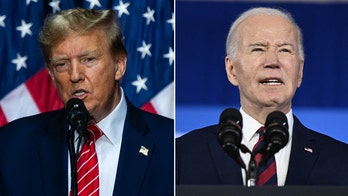A House-Senate negotiating panel on the budget convened Wednesday to discuss ways of easing indiscriminate spending cuts slamming the Pentagon and domestic agencies alike.
Lawmakers on both sides struck a hopeful but cautious tone about the prospects of reaching an agreement that could make progress on curbing the automatic cuts that are the price for Washington's failure to strike a follow-up budget pact to a 2011 agreement to cut agency budgets.
The talks Wednesday in a dysfunctional Washington come after a sustained period of warfare among the main protagonists -- Democrats controlling the White House and the Senate and Republicans leading the House -- is yielding to a moment of smaller-scale talks between lieutenants of top House and Senate leaders.
The idea of a "grand bargain" blending tax increases with politically difficult savings from popular benefit programs like Social Security and Medicare seems to be off the table.
No sooner had the meeting gotten underway in a basement room of the Capitol than the chief negotiators hit one of the most difficult roadblocks facing them: Taxes.
"I want to say this from the get-go: If this conference becomes an argument about taxes, we're not going to get anywhere," said House Budget Committee Chairman Paul Ryan, R-Wis. "We won't resolve all our differences here. We won't solve all our problems. But we can make a good start."
Senate Budget Committee Chairman Patty Murray, D-Wash., said she's willing to consider longer-term cuts to autopilot-like spending on certain benefit programs in order to ease immediate across-the-board cuts to agency operating budgets. But she wants Republicans to put revenue into the mix, too.
"I'm ready to make some tough concessions to get a deal," Murray said. "But compromise runs both ways. While we scour programs to find responsible savings, Republicans are also going to have to work with us to scour the bloated tax code -- and close some wasteful tax loopholes and special interest subsidies."
Lawmakers generally are trying to put together a smaller-scale deal that would ease across-the-board cuts known as sequestration that are hitting federal agencies. Virtually no one thinks a "grand bargain" blending hundreds of billions of dollars in new tax revenues and fundamental restructuring of expensive benefits programs is possible.
Democrats are still pressing for new revenues but are running into predictable opposition from GOP conservatives.
Wednesday's meeting involves speechmaking rather than real negotiating, but a consensus already seemed to emerge about limiting the scope of the talks to finding ways to deal with the across-the-board spending cuts.
Democrats are eager to ease cuts to domestic programs like Head Start preschools, education grants to local schools and infrastructure projects.
Republicans are especially worried about cuts to the Pentagon, which would grow even deeper after the turn of the year.
"We might as well shut down the Pentagon because it'll basically hollow them out," House Armed Service Committee Chairman Howard "Buck" McKeon, R-Calif., said.
The sequestration cuts began to bite in March, but an upcoming round of cuts will hit the Defense Department even harder. The Pentagon and domestic agencies have found ways to manage the automatic cuts through bookkeeping tricks and one-time maneuvers, but worries are running high that the round coming next year will be far worse.
Another obstacle to a deal is the reluctance of Democrats to cut domestic programs to pay for easing cuts to the Pentagon budget. If Republicans won't allow new revenues to be used to offset additional defense spending, negotiators would have to look at the Pentagon's popular Tricare health care program and its generous pension benefits.
Washington endured a lengthy power struggle this month over keeping the government open and raising its borrowing cap. Conservatives like Sen. Ted Cruz, R-Texas, advocated shutting down the government to try to force Democrats to defund Obama's health care law, but the maneuver backfired with the public.
Expectations for the talks are limited at best, given the acrimonious history, but both sides have an incentive to reach a bargain that would win favor among both GOP defense hawks and Democratic defenders of domestic programs.
"I'm always optimistic," Rep. Mike Simpson, R-Idaho, said. "Do I think it will happen? I don't know."




